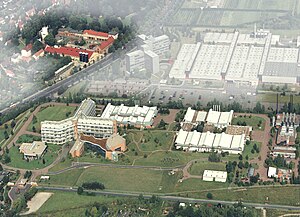 Image via Wikipedia
Image via WikipediaA surge of asylum seekers arriving from world trouble spots, including Afghanistan, Somalia, Iraq and Iran, has forced Berlin authorities to re-open a huge refugee housing site.
Only recently, government officials had considered putting the 22,000-square-metre Marienfelde Refugee Camp up for sale.
The refugees stay in plain apartments in 10 centrally heated housing blocks. During the Cold War it was the first place to stay for people escaping communism while they were starting new lives.
Between 1949 and 1990, 1.35 million people passed through the camp. Even after democracy took hold in their homelands, eastern Europeans kept arriving, along with refugees from further away.
But in recent years, the numbers dwindled and a decision was taken to close the camp. But its closure a year ago proved premature and the camp has now been re-activated. Some 125 refugees have shown up at the Marienfelde camp in the past two weeks.
Hundreds more are anticipated in the coming months.
During the course of 2010, 2,000 people registered for political asylum in the German capital and that figure is likely to increase greatly in 2011, according to concerned Berlin city officials.
With the Marienfelde facility closed, asylum seekers stayed in other hostels refugees, which became overcrowded.
‘A solution had to be found to ease the pressure,’ explained Ute Sternal, the director at Marienfelde. She also runs a similar facility housing 300 people – 190 of them refugees – in nearby Trachenbergring.
One of the first asylum seekers to move into Marienfelde in early December was Razija Ghassimi, 30, from Afghanistan.
Along with her husband and her three youngsters, she was allocated a small second-floor flat at the camp, which she appreciates because it is ‘far away from the terror and violence in Afghanistan.’
In another housing block lives Asaf A, who hails from war-shattered Grozny in Chechnya, with her four children.
‘After my husband learned he was to be compulsorily drafted into the army in 2006, we fled Grozny and headed to Poland via Moscow,’ she said through an interpreter. But three years later her marriage collapsed when her husband fell in love with another woman.
After he threatened to take the children away with him, she said she fled with them from Poland to Germany.
‘If my asylum application is granted I plan to settle here, learn the language and get a job, no matter what, in Berlin,’ she said.
The Marienfelde camp is run by the Internationale Bund (IB), a social-welfare organization which has responsibility for 23 similar emergency accommodation projects in Berlin.
Other recent arrivals include two tall young men, both in their early 20s, from Somalia. They share a modest, first-floor apartment in a snow-bound housing block near the camp entrance.
They were hesitant about talking with journalists, but one, Jamac Iljaz, said his father was murdered during violence in Mogadishu earlier this year and he fled the country, fearing for his future.
Two other Somalis working inside the camp were Hassan Husen, 18, and Ahmed Hassan, 25.
Not allowed to take full-time jobs in Germany until a decision is taken on their asylum applications, they keep active by doing relief work approved by government labour authorities.
Though they work at Marienfelde, they stay at another Berlin hostel in the inner city with 285 other refugees.
‘We are relieved to be in Berlin,’ says one of them. ‘Berlin is a good place to be, and the people are friendly. I hope we’ll be allowed to stay.’
Berlin has seen a steadily growing number of asylum seekers from Somalia in the past six months. Many say their African homeland has, ‘morphed into a haven for terrorist groups’ in recent years, an interpreter says.
Murseli Ismet, an Albanian, is one of several International Bund interpreters currently employed at the Marienfelde premises.
Close on 60 of the refugees at the camp are from Serbia, many of them gypsies, he says.
‘Most of them claim life in Serbia has become intolerable, and that they have suffered discrimination, often being regarded as ‘second-class’ citizens by the authorities.
‘Here in Berlin, few speak any German, so I interpret for them,’ says Ismet, who himself has been here since 1990 after leaving Kosovo at the height of its troubles.
One of the asylum seekers asks to be quoted by his first name, Dalibor, only.
A married musician from Leskovac, he says: ‘Life hasn’t been pleasant in Serbia. I’d welcome the chance of starting something new here, and the chance of sending my kids to a Berlin school.’
The family’s chances are not favourable.
Most gypsies from Serbia have their political asylum applications rejected within three months, and have to leave Germany again.
HT: Refugees United Australia








 Join our page
Join our page


0 comments:
Post a Comment